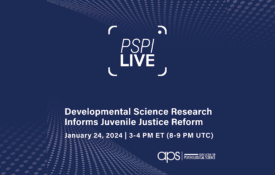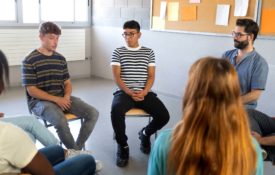-
Quaker Parents Were Ahead of Their Time
… So here I am, nearly 375 years after Quakerism’s founding, asking my kids questions, giving them bounded autonomy, and nudging them to invest in their strengths and be stewards of their community—all while communicating Visit Page
-
Adolescent Anxiety Is Hard to Treat. New Drug-Free Approaches May Help
Adolescence is a remarkable period of development and learning, a time when youths explore and adapt to changes in their social worlds and begin to form a sense of who they are and hope to Visit Page
-

Teens Who View Their Homes as More Chaotic Than Their Siblings Have Poorer Mental Health in Adulthood
Many parents ponder why one of their children seems more emotionally troubled than the others. A new study in the United Kingdom reveals a possible basis for those differences. Visit Page
-

PSPI Live: Developmental Science Research Informs Juvenile Justice Reform
In a January PSPI Live webinar, authors of a forthcoming article came together to discuss juvenile justice reform. Visit Page
-

Detention Fails to Help Young Lawbreakers Avoid Further Offenses, Report Shows
Youth who are caught committing crimes are far less likely to reoffend when they receive rehabilitative help, such as therapy and life-skills training, rather than a legal punishment. Learn more about the new PSPI report and what bringing systems and science to find solutions could do to help young people. Visit Page
-
The Pandemic Disrupted Adolescent Brain Development
Before COVID, American teenagers’ psychological health was already in decline. The pandemic, with its sudden lockdowns, school closures and other jolts to normal life, made that downward slope steeper. The ensuing mental health crisis has Visit Page

